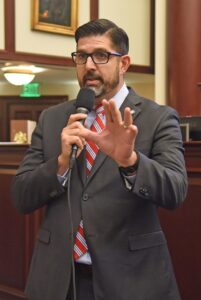
Senate Bill 148, also called “individual freedom,” would censor discussions of race and gender in classrooms and workplaces. Introduced by Republican Senators Manny Diaz and Ray Wesley Rodrigues, the bill would censor protected speech by banning the teaching concepts about systemic racism and gender and race discrimination.
It would also allow employees to file a discrimination claim against an employer who engages in those trainings or discussions. In simple terms, it would ban making white people feel bad when teaching or talking about racism.
Diaz discussed part of the bill that states, “An individual should not be made to feel discomfort, guilt, anguish or any other form of psychological distress on account of his or her race.”
Some see this effort as the Legislature trying to prevent educators from teaching certain curriculums about the history of the United States, especially the role slavery played during the formation of the United States and the segregation that followed the Civil War.
Critics of the legislation say it could eventually erase the history of experiences of marginalized communities. Orange County science teacher Walter Johnson says it’s a violation of the First Amendment.
“It protects the right to share ideas, information and knowledge,” Johnson said. “Teachers should be able to have conversations freely to students, and students should be able to learn about our history and impact on the community. They need to know why certain things are set the way they are.”
He also said that white people would not be held accountable for what happened to Black people, but the history must be talked about.
“To this day I have not heard any teacher say they feel uncomfortable teaching history,” Johnson said.
Ron DeSantis, Florida’s Republican governor, has voiced support for the bill, calling the critical race theory “crap” at a news conference last month. He affirmed that he would pass legislation allowing parents to sue schools and employers if they were forced to listen to race- and gender-related issues.
So far, the bill has cleared the Senate’s Education Committee by a 6-3 vote. It is slated to be heard in the Rules Committee, but no date has been set.
The bill also received six statute citations, one stating that unlawful employment practices and discrimination in treatment of minority representation, according to the Florida Senate. The American Civil Liberties Union has come out against the bill and agrees that legislators should not “interfere with a student or employee’s right to receive an inclusive education just because certain aspects of history make some people uncomfortable.”